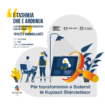
Armend Kelmendi
Written by Armend Kelmendi, sports law advisor and football intermediary [Managing Partner, AK Sports Consulting & Partners L.L.C. and AY Sports Management AG]. The current situation and the potential consequences of the pandemic for the football industry include: failure to fulfill contractual obligations toward players, sponsors, and contractors; the need to review existing FIFA regulations, particularly those on the status and transfer of players, as well as adjustments to transfer windows; the establishment of financial support funds for clubs due to economic losses; compensation for purchased tickets and rescheduling of seasonal subscriptions; and the recommendation for players to follow Swiss hygiene practices.
The world is now facing the rapid spread of COVID-19, a pandemic of historic proportions, impacting every aspect of life. Unsurprisingly, this has caused complex challenges in the world’s most popular sport—football. While governments and health institutions act to prevent and manage the disease, key football stakeholders have also shown readiness to act in line with national and international institutional decisions. These include FIFA, UEFA, national football federations, and importantly FIFPro—the global representative body of professional footballers—as well as club management, investors, and other legitimate interest groups.
In response to the virus outbreak, these institutions have decided to update competition calendars. Football fans already know that EURO 2020 has been postponed to summer 2021. The UEFA Champions League and Europa League finals were also postponed to June, and Copa America was moved to 2021. Other events affected include the U-21 European Championship, the Women’s Euro, and various youth tournaments under UEFA. Crucially, football governing bodies have formed task forces to monitor the situation.
Under current circumstances, and unless further changes are made, the most effective scenario is one that ensures player health while allowing clubs to fulfill remaining contractual obligations. Restarting competitions should be determined by state-level decisions specific to each league. With UEFA and CONMEBOL postponing major tournaments, there’s less pressure on meeting previous deadlines. Therefore, decisions should be case-by-case, reflecting each country’s public health context.
COVID-19 has already affected hundreds of players across top leagues—Premier League, Serie A, La Liga, Bundesliga, etc. Still, there is hope to complete the current season before the summer transfer window opens. This would allow for some rest for players and football staff and help prepare for the new season.
Even with this ideal scenario, several conditions must be met. While secondary to public health, these conditions include:
- Maintaining contractual stability (fulfilling financial obligations).
Affected parties should use this break to discuss current wages, especially if clubs struggle financially. Salaries might be reduced or delayed, as expected in top leagues like Serie A or La Liga. In some cases, employers or sponsors may fail to meet financial commitments. For instance, several Norwegian clubs have temporarily laid off players, who will receive limited state support for up to 20 days to avoid bankruptcy. Such measures mostly affect young or foreign players.
- Fulfilling obligations to sponsors, staff, broadcasters, and ticket holders.
Clubs must meet their contractual commitments to staff and sponsors, and federations must honor agreements with TV broadcasters. Rushing to complete leagues to avoid penalties could be dangerous. Health must come first, and any decisions to resume must not be driven by external pressures.
Clubs and federations must also offer compensation to fans who purchased tickets for postponed matches. This is manageable, and efforts are underway—FIFA, UEFA, and leagues like the Premier League are working on solutions for all stakeholders.
- Negotiating to retain the best team lineup and resolving contracts and loan agreements expiring mid-year.
For players whose contracts end in June, clubs should negotiate extensions. This also applies to loanees whose terms expire before the official summer transfer window.
Player and/or intermediary position?
Legally, players with expiring contracts have no obligations past June 30. Clubs may try to persuade them to stay, but it’s up to the players to show solidarity. Some professionals might remain loyal, while others might not, due to the risk of injury, existing pre-contracts with new clubs, or unmet financial expectations. Top players, especially, may be lured away by other clubs offering better deals.
For agents, it’s difficult to justify risking a player’s health or career by playing past their contract end. Their job is to mitigate such risks.
Ultimately, how the pandemic evolves and how quickly we recover remains to be seen. In Kosovo, football clubs, players, and stakeholders should consider these steps:
- Maintain direct communication between clubs and players to ensure contractual stability.
- Avoid discussing contract termination through unofficial or public platforms; professional dialogue is key.
- Follow decisions from state authorities and international football bodies via FFK.
- Adopt Swiss models of hygiene as suggested by SAFP and FIFPro.
- Encourage FFK to engage clubs and the players’ union in finding relief measures.
Globally, the sports world is combating fear by suspending or postponing events. Football, NBA, Formula 1, and even the Olympics have been affected.
FIFA has shown leadership by calling for unity and shared responsibility. If followed by financial aid programs, regulatory updates, and ongoing support, this will bring stability to the industry. So much coordination is needed that it can’t be fully covered in just a few pages.
Meanwhile, football lives on—in our yards, balconies, TVs, devices, and imaginations. Until next time!







